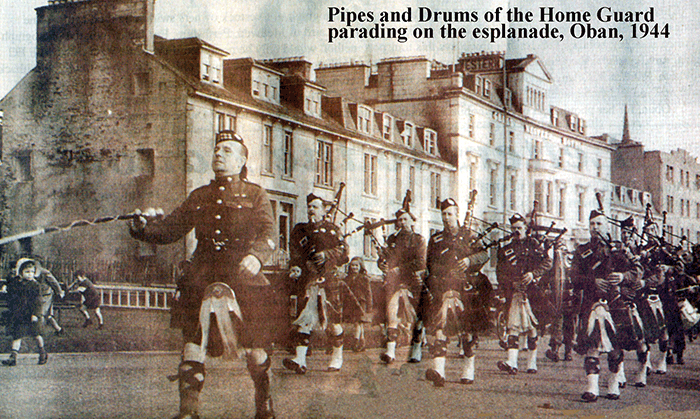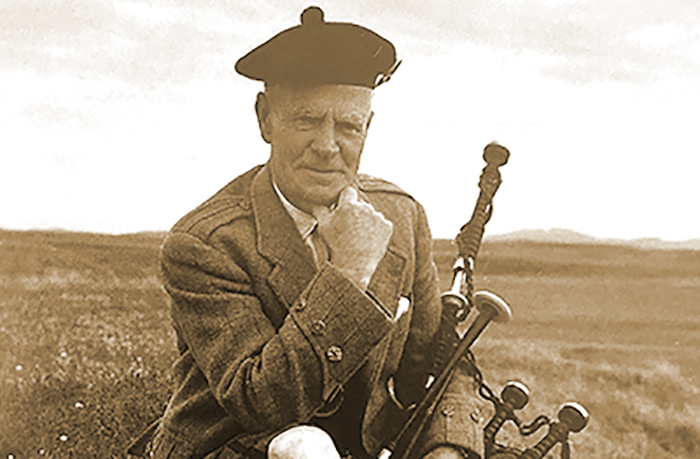
On the Home Front, many pipers who were either too old or two young for service in the forces, or who were in reserved occupations, joined the Home Guard and many pipe bands were formed within that organisation.
John Seton served with the Argyll and Sutherland Highlanders during the First World War and afterwards joined the Glasgow Police. For many years he was the Drum Major of the police band.
By Jeannie Campbell
On the outbreak of WW2 he was too old for active service but, according to the ‘Piping and Dancing’ magazine, did not consider himself too old to serve. He spent the war years doing valuable work behind the scenes in connection with the Home Guard.
Towards the end of the war Captain Donald Ross MacLennan was Captain Quarter-Master of the Home Guard. ‘DR’ as he was known in piping circles, was himself a top solo professional piper [a double Gold Medallist] so was able to give support and assistance to the HG pipe bands.
Hector MacLean from Oban, Argyll, was a descendant of a piping family. His great great grandfather Neil MacLean had won the first prize at the Falkirk Tryst competition in 1783 and his great grandfather Allan MacLean had won the first prize in the Highland Society of London’s competition at Edinburgh in 1810.
Hector had been taught by William MacLean, Kilcreggan, and John MacDonald, Inverness, and became piper to the Captain of Dunstaffnage an estate near Oban. During WW1 he had served with the Scottish Horse and the Black Watch.
During WW2 he was a member of the Dunbartonshire Home Guard band and from 1950 Pipe Major of Babcock and Wilcox in Renfrew.
Hector is best remembered as a composer however. His tune, The Knightswood Highlanders, was awarded first prize in a composing contest organised by the eponymous association after the war. Allan Rowan of Port Appin, by Captain John MacLellan, was second and the Knightswood Ceilidh by P/M Donald MacLeod, third. (This last is the best known and most played of all three pieces.)
Another of Hector’s compositions, The MacLeans’ Salute, came second in a piobaireachd composing contest organised by the BBC. Angus MacPherson was first with Salute to the MacCrimmon Cairn at Borreraig.
In August 1945, whilst fighting continued in the Far East, Milngavie Highland Games were held under the joint auspices of the Glasgow Uist and Barra Association and the 3rd Dunbartonshire Battalion of the Home Guard Pipe Band.

This was the second year of the Games, but the first time they included a piping competition. Twenty leading pipers took part and the judges were P/M William MacLean, Kilcreggan, P/M George MacDonald, Dunoon, and P/M Hector MacLean. The results were:
Piobaireachd:
1 P/M John MacDonald, Glasgow City Police
2 John C. Johnston, Glasgow Police
3 Pipe Corporal Donald R Stewart, 3rd Btn. Dunbartonshire Home Guard
4 Nicol MacCallum, 8th Argylls
5 Roderick MacDonald, Glasgow Police.
March, Strathspey and Reel:
1 P/M John MacDonald
2 Roderick MacDonald
3 P/M Charles J Scott, 12th Btn. Glasgow Home Guard
4 Nicol MacCallum
5 John MacKinnon, Glasgow.
The Callander Home Guard pipe band wore the uniform and tartan of the Cameron Highlanders. After the war the band continued as the Callander and District pipe band and to this day still wear Cameron tartan as a tribute to their war-time origins.
- To be concluded. To read earlier excerpts in this fascinating history type WW2 into the Search field.















Jeannie Campbell
Good Morning, Am enjoying very much your short articles on bagpipes and pipers in WW2. Am working on two books right now, bagpipes/tunes/history in WW1 and then WW2. Each collection is about 200 tunes right now on battles, leaders, heroes, units, ships, memorials, and other related categories. If you are interested I can share with you the Table of Contents which shows you the tune, some history, source, and more. If I list on the TOC I have the tune in PDF files now in the folders. Glad to share those also on Dropbox or Google Drive. Value your thoughts and any help in getting the right tunes, that go to that time periods.